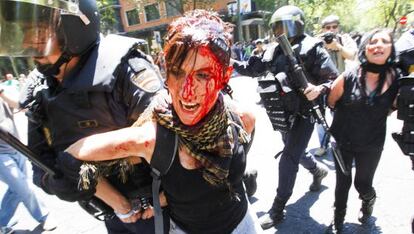"Black march" meets thin blue line as Madrid mining protest turns ugly
Seventy-six injured in clashes between marchers and police in capital


Two days after the central government delegate in Madrid, Cristina Cifuentes, noted that the “black march” organized by protesting miners had been entirely without incident, the denouement of the 430-kilometer journey descended into violence in the center of the capital.
The 200 marchers were joined by thousands of sympathizers and members of the labor unions as they marched from Colón square to the doors of the Industry Ministry along nearby Paseo de la Castellana on Wednesday. Among the newcomers were members of the 15-M protest movement, teachers protesting cuts in education, families and politicians. Also among the throng — which the CCOO and UGT labor union expected to be 25,000 strong, although no official figures were available — were what an Interior Ministry spokesman described as “anti-system groups, armed with bottle rockets and bricks.”
Shortly after the march arrived at the Industry Ministry, violent clashes between police and protestors began to erupt. Some marchers attempted to break through the police barrier outside the ministry and all sorts of objects were hurled at security forces. Of the 76 people injured in the clashes, 42 were protestors and 33 were police officers. Also hurt in the mêlée was a photographer working for an online publication based in Asturias, one of the regions worst affected by the proposed cut of 63 percent in subsidies to the industry this year, which the sector fears would augur the end of coal mining in Spain.
Police made eight arrests — none of which were of miners — and employed rubber bullets after firing several warning salvos.
The black march had set out from coal mining regions across Spain — Asturias, León, Palencia and Aragon — with the intention of making its voice heard. “We’re like the Spanish football team, without dropping a cup,” joked Faustino Balaguer as he departed Puerta del Sol square on Tuesday evening at the beginning of the night protest march organized by the miners.
Thousands of supporters greeted the marchers with cries of “champions” and “this is our team,” inspired by Spain’s recent European success. Firefighters also joined the march as its numbers swelled ahead of the planned Wednesday stretch between Colón and the Industry Ministry, which was headed by the 200-odd veterans of the black march. “You are the pride of the working-class struggle,” was one of the most repeated slogans shouted by civilian participants.
“Coming here is the most honorable thing I have done in many years,” said Luis, a miner who had arrived on one of the 500 buses organized by mines across the country to ferry more protestors to the capital. “Our demands are justified.”
José Manuel Martínez, 12, was under no illusions as to why his father had brought him to Madrid. “If they close the mines, we’ll lose our homes,” he said.
The secretary generals of the UGT and CCOO labor unions, Cándido Méndez and Ignacio Toxo, who marched behind the leading miners, accused the government of bringing the conflict upon itself by acting with “injustice, insensitivity and a complete lack of intelligence” in its dealings with the sector.
No representative of the Industry Ministry, headed by José Manuel Soria, agreed to meet with the protestors on Wednesday.
Tu suscripción se está usando en otro dispositivo
¿Quieres añadir otro usuario a tu suscripción?
Si continúas leyendo en este dispositivo, no se podrá leer en el otro.
FlechaTu suscripción se está usando en otro dispositivo y solo puedes acceder a EL PAÍS desde un dispositivo a la vez.
Si quieres compartir tu cuenta, cambia tu suscripción a la modalidad Premium, así podrás añadir otro usuario. Cada uno accederá con su propia cuenta de email, lo que os permitirá personalizar vuestra experiencia en EL PAÍS.
¿Tienes una suscripción de empresa? Accede aquí para contratar más cuentas.
En el caso de no saber quién está usando tu cuenta, te recomendamos cambiar tu contraseña aquí.
Si decides continuar compartiendo tu cuenta, este mensaje se mostrará en tu dispositivo y en el de la otra persona que está usando tu cuenta de forma indefinida, afectando a tu experiencia de lectura. Puedes consultar aquí los términos y condiciones de la suscripción digital.








































